#justice mukheli
Explore tagged Tumblr posts
Text

















Fhatuwani and Justice Mukheli launch Studio Mukheli
Photographer: @ndunamadunavisuals
Follow for more: instagram.com/ndunamadunavisuals
#Nduna Maduna#Nduna Maduna Visuals#NdunaMaduna#NdunaMadunaVisuals#Fhatuwani Mukheli#Justice Mukheli#Studio Mukheli#film photography#original photographers#model#outfit#art studio photoshoot#art studio#artwork#artists on tumblr#black tumblr#photographers on tumblr#tumblr milestone#original character#johannesburg freelance photographer#johannesburg south africa#johannesburg#johannesburg photographer#photographer#gauteng#pretoria#durban#cape town
2 notes
·
View notes
Text
it just gives me chills – the fact that hardly any more days left for Janmashtami... and maybe just maybe what you've written is going to come true this time... it gives me the courage to hope that this time he'll be here to help... to save us... to help us get justice... to protect us
Guys imagine...
It's 11:59 PM in the night of Sunday
The alleys are dark
Demons in human skin are laughing
Women are being raped
Protestors are doing candle marches
An old lady, very old, watches the TV with horro in her eyes and folds her palms, looks at the small Laddoo Gopal ki murti in her Pooja Home and says, "Ab to aao Girdhar Gopal, kabse aas lagaye hai." (atleast now come, Girdhar Gopal. We await you to to come {and annihilate evil}.)
Away from all this at a small house near a river, the loud cries of a woman rattled the whole house as she pushed at her stomach, the pain being unbearing as she cried out for help, the midwives helping her. Lightning started to crackle in the sky, heavy rain started pouring down with lightning and lightning, the river was in full swing.
With a final cry the pain subsided, her face drenched in sweat and tears as she felt herself fainting, when her eyes were snapped open as she felt something on her chest.
"You have birthed such a beautiful baby boy, look!" The midwife had cried out happily and she teared up, looking at the dark skinned small bundle of joy, who was crying, covered in a thick blanket.
Suddenly her eyes were dazzled by the effect of a bright light, and she closed her eyes in between. She slowly opened one eye and looked up, and was stunned. The huge silhouette of a man with four arms holding different things stood in front of her, as she looked wide eyed at the huge silhouette in front of her, and then slowly looked at the baby.
Suddenly it clicked her...
𝐘𝐚𝐝𝐚 𝐘𝐚𝐝𝐚 𝐡𝐢 𝐃𝐡𝐚𝐫𝐦𝐚𝐬𝐲𝐚, 𝐆𝐥𝐚𝐚𝐧𝐢𝐫𝐛𝐡𝐚𝐯𝐚𝐭𝐢 𝐁𝐡𝐚𝐚𝐫𝐚𝐭𝐚𝐡..
𝐀𝐛𝐡𝐲𝐮𝐭𝐭𝐡𝐚𝐧𝐚𝐦-𝐚𝐝𝐡𝐚𝐫𝐦𝐚𝐬𝐲𝐚, 𝐭𝐚𝐝𝐚𝐚𝐭-𝐦𝐚𝐚𝐧𝐚𝐦 𝐬𝐫𝐢𝐣𝐚𝐦𝐲𝐚𝐡𝐚𝐦..!
𝐏𝐚𝐫𝐢𝐭𝐫𝐚𝐚𝐧𝐚𝐲 𝐒𝐚𝐚𝐝𝐡𝐮𝐧𝐚𝐦, 𝐕𝐢𝐧𝐚𝐚𝐬𝐡𝐚𝐲-𝐜𝐡𝐚 𝐃𝐮𝐬𝐡𝐤𝐫𝐢𝐭𝐚𝐦..
𝐃𝐡𝐚𝐫𝐦𝐚-𝐬𝐚𝐧𝐬𝐭𝐡𝐚𝐚𝐩𝐚𝐧𝐚𝐚𝐫𝐭𝐡𝐚𝐚𝐲, 𝐒𝐚𝐦𝐛𝐡𝐚𝐯𝐚𝐚𝐦𝐢 𝐘𝐮𝐠𝐞 𝐘𝐮𝐠𝐞...!
Inspired by this post of @she-rambled-but-they-were-true
@harinishivaa @mahi-wayy @yehsahihai @houseofbreadpakoda @blossommoonart @myvarya @zeherili-ankhein @warnermeadowsgirl @krsnaradhika @desigurlie @ramayantika @mrityuloknative @xxdritaxx @thegleamingmoon @sumiyxx @chaliyaaa @stxrrynxghts @sambaridli @sanskari-kanya @ulaganayagi @voidsteffy @krishna-sangini @nidhi-writes @janaknandini-singh999 @ramcharantitties @ririsasy @kaal-naagin @mounamelanoyi @thecrazyinktrovert @sada-siva-sanyaasi @chaanv
#ebar tumi punoray dharma sthapan korte asho krishna... jei prithibi te naari der maan haani kora hocche protidin...#jei kaliyug e naari der opor otyachaar kora hoy sudhu matro bhul er saath na diye mukh kholar jonno... sei khane tomake astei hobe Krishna#amader raksha koro... amader bichaar chai#justice for abhaya#we want justice#justice for rg kar#justice delayed is justice denied#we demand justice
215 notes
·
View notes
Text




#Justice Mukheli#African photographers#South Africa#Jojo Abot#African artists#African women in music#Ghana
52 notes
·
View notes
Text










Photographed portraits of GQ Best Dressed for my Recent Contribution to GQ South Africa Jan/Feb issue.
#gq south africa#photography#themba mbuyisa#gqbd#gqbd2021#bobthestylist#justice mukheli#gq#teddy nkonde
13 notes
·
View notes
Text
Justice Mukheli On Telling Authentic African Stories Through Art
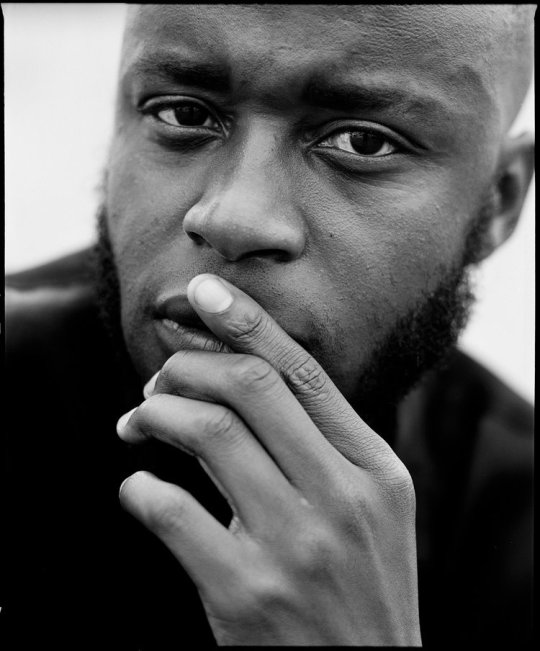
Justice Mukheli is a film director, photographer, and artist. Through his visual storytelling, he takes viewers through a journey of African stories that embody truth, power, and beauty. He documents everyday South African experiences through his lens which makes his art feel like home. It is evident that Justice Mukheli is rooted in his heritage as he draws inspiration from his upbringing in Soweto to enrich his work. Whether he is capturing on film or digital – his photography is full of soul, which can be seen through the eyes of his subjects. Art becomes a conduit for Mukheli to heal, breathing life into untold stories and contribute towards moving the African culture forward.
From working as an Art Director at Draft FCB to being a Commercial Director for Romance Films TV, how Justice Mukheli has constantly elevated himself through a plethora of creative mediums is truly inspiring. During our catchup in Rosebank over coffee, I learned more about his journey from advertising to art, how he achieved his tremendous success as well as his new path of being appointed the Commercial Director at one of the best production companies in the world, Romance Films TV.
1. How did growing up in Soweto inspire your vision of storytelling?
Growing up in Soweto inspired me in a lot of ways that are beyond the storyteller I thought I would become. The way we grew up and being a child at the time, Soweto was amazing. There was a freedom that kids don’t have – now that my life is this side of the world. Maybe on a weekend, I would just wake up and leave the house at 7 o’clock and go explore with my friends, come back before the sunsets. And it would be either from going to catch locust in the bush or creating our soccer field somewhere in the bush corner or playing under tunnels. We used to get under tunnels and walk. For example, we would get into a tunnel here, go through the tunnel, and get out in Bryanston. They were like a maze. There were so many activities as a kid. My childhood was amazing with memories and my parents were amazing. I was very close to my dad for the time he spent with us, close to my mum. She used to bake, we used to help her bake and knit. There was so much available to entertain me as a kid growing up in Soweto. There were these older gentlemen, friends of my uncles who dressed up incredibly beautiful and you grow up seeing that and aspiring to that. The car culture, sneaker culture, fashion culture – there was just so much.
2. What are some of the unforgettable childhood experiences you believe shaped who you are today?
When I get work or need to do or tell a story, I have a huge bank of resources and stories to borrow from, to look back into. I become excited about how I can bring those lived experiences into life, into the story I was trying to get. As a commercials director, when I get a brief most of the time, I look back there in my bank of memories. Have I experienced something like this? My latest commercial is about a funeral plan – this old man leaving his last message to his wife. So when I got briefed, it became immediately clear to me that I have experienced this. The point of view might have been different because I was a child but I can remember all those moments when my grandmother lost my grandfather and what happened and the nuance in how she was and how she dealt with the nuance of my culture and how we deal with loss. That was a huge and most incredible resource to go look into as a source of inspiration and borrow from. To breathe that experience into that piece so that it feels authentic. As a filmmaker and artist, we recreate moments and it’s in how close to reality we get. That’s my tool. It’s what I use all the time.

3. You recently joined Romance Films TV as a commercials director. How do you feel about this new path?
I am beyond excited about it. I wrote on my Instagram post that I have been inspired by Romance Films TV before I even thought that I would be a filmmaker. From 2009, when I got into advertising, I remember they would say to us when you write your advert you must write it for Grey Gray to take your script, to even consider shooting your ads for you. Grey Gray is a founding partner for Romance Films TV. He is incredible. He is an incredible storyteller. We used to write these ads and send them to their company. We would cross fingers that he considers our script. Unfortunately, when I was still in advertising I never got to work with him. Maybe our scripts were not good enough. It is exciting that the loop closed. I am excited to learn from them. There is Terence Neale who is incredible, he works mostly internationally. His ads are breathtaking, such as the ad he did for Beats by Dre. I have known them and had a friendship with them for a long time. It feels right to have joined them now because I have gained my own experience. I have scrabbled, built myself and built my confidence. I have proved that I can be a filmmaker. Now it’s amazing that I am part of a team that I have reached to be a part of for the longest time.
4. From working as an Art Director to being a Commercial Director, how did you navigate the transition from advertising to art and how did you own that space?
The transition was relatively easy. And I say this because advertising is an incredible teacher. Marketing teaches you how business works, positioning, and what you need to do to get a product to a certain target audience. I saw myself as a product when I started my journey as a photographer. Like okay cool, I’m a photographer. How do I get myself seen by those I want to book me? I had to build a portfolio using knowledge from advertising. I was in advertising for 7 years before I transitioned. My understanding of the industry helped my transition work seamlessly because I knew what to do. I knew the power of a portfolio, I knew how to get myself in front of the target audience that I need to book me. Owning the space was putting in the work and understanding what is needed to get myself to a position where I am considered or seen as someone interesting in my field or someone who has a different point of view or a different way of doing things. That is part of owning the space and creating work that is unapologetically my voice. And in the same vain, answering the client’s brief and aligning the brand with its target audience. And aligning the brand where marketers intend to get to. I make sure that my work is an extension of what my clients need. As a film director, I am a part of the chain.
Your voice is your own lived experience. For example, when I got briefed on Hollard, there were 2 other directors. There were 3 of us. It’s always important that I borrow from my lived experiences because it will be a unique point of view, a unique point of departure. After all, all the other directors will also come from their point of view, understanding, or lived experiences. That’s how they work and when I present my treatment it will unapologetically be me. It will have my voice, tone, and feels. With Hollard, the way I saw and experienced my grandmother grieve for my grandfather is unique to me. So I reconstructed and rebuilt that world from how I saw it.
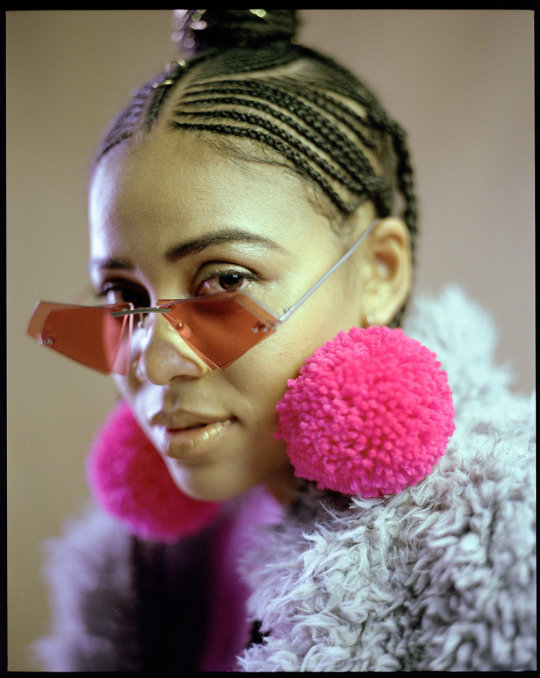
5. In terms of your photography, what qualities must a subject have for it to be captivating enough for you to capture it?
For me, it’s not about aesthetic qualities, it’s about the feeling I get from the eyes. It’s not an aesthetic thing. It’s mostly eyes and the feeling that I am trying to capture. My creative process is led by feeling rather than an idea. The idea is secondary to me. For me, the important thing is how does it make me feel. I have always felt that advertising teaches us that “idea is king” and I agree. But for me, the feeling is more important than an idea because you can get an idea but it doesn’t move you. The feeling is more important to me. Sometimes I use to gravitate towards kids a lot because it was a process for me to unpack my other lived experiences - emotions I never got to deal with acknowledge or immerse myself in. Sometimes when we go through what we go through, we are not present enough to go through the emotions of it and deal with it. Photography and film have become a tool I use as therapy for myself. I can tap back into a moment that is important to me and I deal with it, and I can capture that feeling.

6. In your tremendous career, which would you say are your favorite works that you have produced and why?
I love the Ingrams advert and the Hollard advert. There is an advert I have created for South African Tourism, it has a slightly different tone than the ads I am creating now. It was about portraying black people experiencing their land on these spaces that are mostly enjoyed by white people but enjoying them their way. I quite like the advert.
7. The advertising industry in South Africa has transformed in terms of how black culture is represented, however so much work still needs to be done to move the culture forward. What do you think agencies can do better in this space?
Agencies still fall into the mistake of not being mindful of black stories by black people, or at least having black collaborators in the chain of those stories being told. I think the industry very quickly falls into thinking that “ALL LIVES MATTER” type of mentality, that creative is creative. “What makes you think that just because I am a white person I won’t be able to tell a story in a sensitive way?”. I don’t think that’s the conversation. I think the conversation is telling the story most authentically and mindfully. I think advertising needs to create space for black narratives to be inclusive of black people from the process of creating it.
8. If you ever feel a creative block during a project, how do you reconnect and channel your energy?
I have a lot of creative resources and creative outlets. If my photography is struggling, I am going to paint. Now, I have decided that I want to paint again because I am not so inspired photographically. I am going to start to paint more. If directing or my other outlets are struggling, I can make music or I can sculpt, or I can write. I have a lot of outlets.
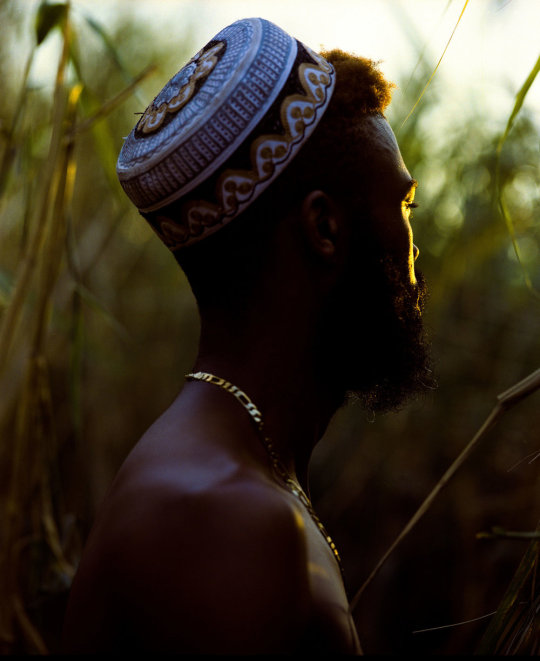
9. Which creative materials inspired you on your overall journey? It could be a film, book, exhibition, documentary, or anything?
It was a book by Malcolm Gladwell called Outliers. It speaks of the 10 000 hours rule and it touches on the people who are amazing that we love and follow. The people who inspire us decided to put in the work, it didn’t happen by chance. That book taught me that whatever I want to be, I can be. I can make that happen, no one else. And it can never happen by mistake.
10. Which brands and artists would you like to collaborate with in the future?
I would love to work with Netflix. And in terms of artists, there is an artist I like called Sibusile Xaba. He’s really amazing. That’s who I would love to collaborate with.
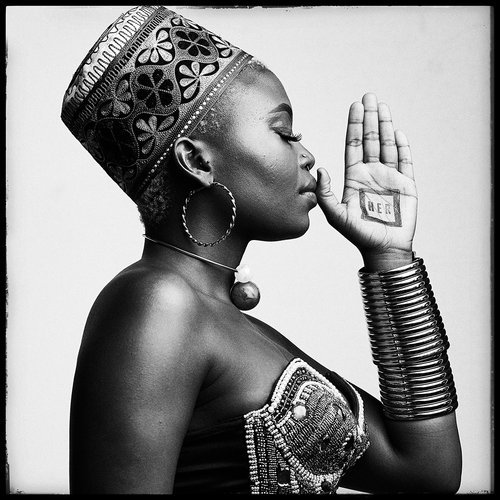
11. And lastly, which words of advice would you give to young artists who aspire to manifest their dreams in this multifaceted creative industry?
My last words would be what I just said about what I got from the book, Outliers – what you want to be, only you can make happen. Great people are not just great by mistake. It just doesn’t happen to them. It was a choice. If you want to be amazing at something, you need to decide to be. It’s a process, it won’t happen overnight.
Image sources: https://www.justicemukheli.com/work Justice Mukheli Films: https://www.romancefilms.tv/directors/justice-mukheli
#SOUTHAFRICANART#thelifedocumentor#Zesintu Mgobhozi#lifestylebloger#African photographers#african art#justice mukheli
2 notes
·
View notes
Photo

From the photoseries “Flipside” Photographer: Justice Mukheli
2 notes
·
View notes
Photo

AnOther Magazine Autumn/Winter 2022 Issue: South African Artist WonderBuhle on the Influence of Ballaké Sissoko
Photography by Justice Mukheli, Styling by Francois Ferreira
Read on
0 notes
Photo

@wandalephoto + @justicemukheli
#Wandale#justice mukheli#Menswear#Mens fashion#Mens style#Johannesburg#African fashion#African style#South African fashion#Street style#Street fashion#Ss#Aw
42 notes
·
View notes
Photo

Eye saw you. Impaired in vision but still eye I saw you.
3 notes
·
View notes
Photo

Shooting Justice Mukheli’s work. | Johannesburg, Gauteng, South Africa.
Shot on film by me.
March 2020.
14 notes
·
View notes
Text
Urban Village; A legacy in the making
Soweto based 4-piece band, Urban Village, have released a new EP, UBABA, their debut for Parisian label Nø Førmat! (home to Oumou Sangaré, Blick Bassy & Mélissa Laveaux). Marrying the day-to-day experiences of black South Africans with ebullient elements from traditional Zulu music, Urban Village is the alias of four experimental musicians all born and raised in the township of Soweto at the tail end of Apartheid; singer/flautist Tubatsi Mpho Moloi, guitarist Lerato Lichaba, drummer Xolani Mtshali and bassist Simangaliso Dlamini.
Urban Village’s UBABA 4-track EP is released with a new single and visuals carrying the same title. The video created for Ubaba (which translates as ‘father’) by fast-rising filmmaker Justice Mukheli is an evocative rendering of daily life in one of the many Soweto hostels which in the 1900s housed black male South Africans, forcibly separated from their families whilst working in the city’s mines. Speaking about the video, Urban Village note; “Justice is our brother from Soweto. From the moment we discussed his vision for the Ubaba video we trusted he would bring the song to life on the screen. The video shows the different roles played by fathers in society; to nurture, to care, to love, and to protect their families. Salute to all the Ubabas out there present in the house”.

How long did it take you guys to settle on the name Urban Village and why that name? Did you guys have any other names in mind?
In a simpler way, the name Urban Village had already been formed by Lerato Ntsane Lchiba in 2013 when conceptualising on the vision for the music. It took the first thought on the name to settle on it and the name came from an inspiration of our residential field in Johannesburg- Soweto location and there were no other names prior that we ad tried before.
How long have you guys been a group and how did the group form?
The concept for the ban was formed in 2013 as you know. Lerato Ntsane Lchiba (Guitar and Backing vocals). He invited Tubatsi Mpho Moloi (Lead Vocals, flute, mbira and guitar) whom he met as a teenager at local jam sessions, Xolani Mtshali (Drums and Backing Vocals) was next to join, with Siman Galiso Dlamini (Bass) the final ‘villager’ to come into the group. Each member was originally friends from childhood coming together to pursue their musical dreams together in this lifetime.
What was it like growing up in Mzimhlophe in Soweto?
Growing up in Mzimhlophe has been very interesting due to its a place that was politically driven and most old artists and leather gurus spent their time. It also overlooks the landscape of the city of Johannesburg and thus has the township’s vibrant energy and vibe.
How would you describe Maskandi to people that have never heard this style of music?
Maskandi music is one of the traditional music forms of South Africa sound scape, it’s genre mainly played by zulu culture people and it’s musical language amongst the Nguni people.
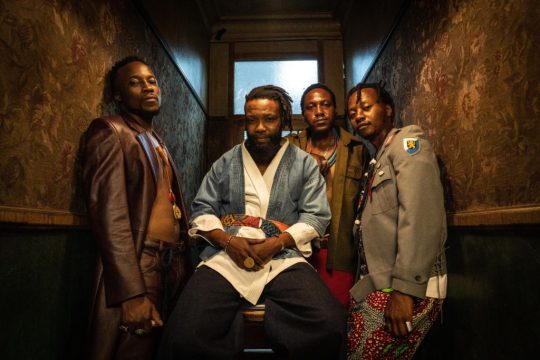
How would you describe Urban Villages sound because I see that you guys like to blend a lot of genres together?
The sound of the Urban Village is layered with elements of folk, maskandi, rock, jazz – a blend of the modern and the traditional. Growing up in Soweto played a major role on how we merge the folk/ indigenous sounds and the experimental modern world music sound. Keeping the identity is the deliberate delivery as we are messengers of the values of our culture.
What is the story of your ep, what is UBABA about?
With our first Ubaba EP, we took inspiration from the rich musical heritage of South African soil. A totally original synthesis of Zulu guitars, indie- folk, maskandi, South African choirs, and jazz, all carried along by an undoubtable energy and charisma. The project opens with the powerful folk of “Ubaba”; then comes “Izivunguvungu” with its poetic sanza loops and harmonious choruses borrowed from the Zulu music style Isicathamiya; “sakhisizwe” follows with its contagious riffs and maskandi guitar melodies and message of “building a nation”. Finally, french DJ and producer Chloé has revisited Izivunguvungu with a trippy and techno twist – to spread “the spirit of futurist indie-folk through nightclubs”. This EP is a journey through all the colours of Soweto, a dormitory town designed to better monitor those who were sent there, that has become the laboratory of music where the hopes of an entire people resonate, even today.
Explain the visuals of the UBABA video.
This story is a period piece that captures everyday life in a Soweto-based hostel during the 90s. The song, entitled Ubaba (Father) and the inspiration behind the film is centred around a place that was predominantly for men, most of them Ubaba’s (Father’s). During the apartheid regime, hostels were a tactic from the regime to separate Ubaba’s (Father’s) from their families, most of them working themselves to an early death in Johannesburg’s mines. The visuals explore those spaces and all the activities that happen in the environment. We see all aspects of emotion from vulnerable male figures, unity, love, dedication, and talent.

If you could describe Soweto in 3 words what would they be?
Soweto is vibrant, cultured and legendary
What are your hopes for the future of SA music?
Our hopes for the future of music SA music is to grow more and get more opportunities in our media space for alternative traditional music
Our hopes for the future of SA music is to grow more and get more opportunities in our media space for alternative traditional music.
Where do you see yourself in 10 years?
In 10 years we see ourselves running an art based initiative of sharing skills and engagement to empower young aspiring arts. Feet in the tradition, head in the future.
Listen to their EP here;
The post Urban Village; A legacy in the making appeared first on CheckoutAfrica.
from WordPress https://www.checkoutafrica.com/urban-village-a-legacy-in-the-making/?utm_source=rss&utm_medium=rss&utm_campaign=urban-village-a-legacy-in-the-making
1 note
·
View note
Text




me and caleb for Wanda Lephoto AW17
Shot by Justice Mukheli
58 notes
·
View notes
Photo

Bongeziwe Mabandla.
Photography: Justice Mukheli
8 notes
·
View notes
Text


21 notes
·
View notes
Video
youtube
Soweto, South Africa -- A couple weeks ago, Urban Village released their new EP Ubaba along with a music video - directed by Justice Mukheli - for the title track. “Ubaba” (which translates as ‘father’) is a lush track that comes just under 4 minutes long and gives listeners a taste of traditional Zulu music. There’s a spiritual lift to the track, from the lush instrumental layers to the light string picking. “Ubaba” has a strength and serenity to it that is comforting and warm.
On the music video, Urban Village noted “Justice is our brother from Soweto. From the moment we discussed his vision for the Ubaba video we trusted he would bring the song to life on the screen. The video shows the different roles played by fathers in society; to nurture, to care, to love, and to protect their families. Salute to all the Ubabas out there present in the house”.
0 notes
